The Ultimate Guide To Finding A Solicitor Near You
According to the Solicitors Regulation Authority (SRA) in 2023, there are over 222,000 solicitors in the UK. This makes it a daunting task to find a solicitor, especially for those who have never had to seek legal help before. The good news is, with the right information and guidance, the process can be made simpler and more manageable.
If you're seeking help with a legal matter, this comprehensive guide will provide a walkthrough on how to find a solicitor near you and get the most out of your relationship. We’ll cover everything important, including:
At Lawhive, we understand the challenges that come with getting legal help. Our mission is to make it easy and convenient for people to get the help they need at a fraction of the cost of a high-street law firm.
How do I know if I need a solicitor?
When you're faced with a complex legal problem, it’s not always obvious whether you should seek help from a legal expert. That's why it's essential to understand what type of legal support you need before making any decisions. In the next few sections, we'll explore whether a solicitor is the right choice for you.
What are the types of lawyers in the UK?

Knowing whether you should pay for help starts with an understanding about the different types of lawyer available. While solicitors are one of the most common, there are also other types such as paralegals, barristers, and legal executives. Each of these legal experts has their own unique skills and specialisations. Understanding the differences between them can help you make an informed decision about which type to choose.
Solicitors
Solicitors are highly skilled legal professionals who can help with a variety of different matters. They regularly offer legal advice, draft legal documents such as contracts and wills, and negotiate on your behalf in legal disputes. In many cases, solicitors can also represent you in court, presenting legal arguments and advocating on your behalf.
One of the primary advantages of working with a solicitor is their ability to provide personalised legal advice tailored to your specific needs and circumstances. A solicitor can advise you on a wide range of legal issues, from buying or selling property to setting up a business. They also have the expertise to help clients navigate complex legal procedures, such as applying for probate or making a personal injury claim.
Unlike other legal professionals such as barristers or legal executives, solicitors are authorised by the SRA (the legal services regulator in the UK) to provide legal services across a broad range of legal areas. This means that they can provide help with a wide range of legal issues and you won’t be required to work with multiple specialists for different aspects of your case.
Barristers
Barristers are legal professionals who specialise in representing people in court. They are usually experts in a very specific area of law and are sought after for their specialist knowledge.
Barristers have a few specific responsibilities that differ from those of solicitors. They are responsible for preparing and delivering arguments and presenting evidence in court. This includes cross-examining witnesses, questioning expert witnesses and presenting legal arguments to the judge or jury. Barristers are also responsible for drafting legal documents such as pleadings, submissions, and appeals.
It's important to note that barristers cannot directly provide legal advice to you. Instead, people seeking legal advice and the services of a Barrister should first consult with a solicitor, who may then instruct a barrister on the client's behalf. Barristers cannot directly negotiate with opposing parties, nor can they initiate legal proceedings on behalf of clients. These tasks are the responsibility of solicitors.
Legal Executives
Legal executives are a type of legal professional who specialise in a particular area of law. Unlike solicitors, they are not required to complete the solicitor qualification exam but do have qualification from the Chartered Institute of Legal Executives (CILEX). Legal Executives are experts in their chosen area. Whereas a solicitor will generally gain broad experience across a few areas, it's far more typical for a legal executive to develop a deep level of knowledge within a single area. If you have a legal matter that touches upon a range of different legal areas, it may be better to seek the services of a solicitor who can provide a wider range of legal services and has a wider range of legal training. If you require a specialist in a particular area of law, a legal executive can be a good option and as an added bonus they typically charge far less than solicitors.
What type of legal expert should I pick?
When it comes to choosing the right type of legal expert it's important to consider the complexity of your case, your budget, and the level of support and guidance you require. A solicitor can often provide a broad range of legal services, a barrister may be more appropriate for representation in court and a legal executive may be an appropriate (and cost effective) solution if you need help with a certain area of the law. The majority of people that find themselves needing legal advice or help will find that a solicitor or experienced legal executive is most appropriate. We will focus for the remainder of this guide on solicitors.
When should I use a solicitor?

If you are faced with a legal issue, it's important to first identify the type of problem you are dealing with. While some legal issues may seem straightforward, there are often complexities and nuances that only a legal expert can identify. In general, legal issues can be divided into two broad categories.
Simple legal issues that you can handle yourself with a bit of guidance and research
More complex legal issues that require the help of a legal expert.
If you think your legal issue falls into the first category, it’s important that you think through whether there could be any factors that make your situation more complicated than it appears on the surface. This could include if there is a lot of money or property involved, or if there is anyone else involved that may not be on the same page as you are.
If you are unsure whether you need the assistance of a solicitor, consider the following:
Complexity of the issue
If your legal issue is complex, or has the potential to have a significant impact on your life, it's likely that you will need the assistance of a solicitor. Solicitors have the knowledge and expertise to navigate complex legal issues and provide you with the support and guidance you need to make informed decisions.
Time and resources
Even if you think you can handle the issue yourself, do you have the time and resources to do so? Legal issues can often be time-consuming, requiring extensive research, paperwork, and court appearances. A legal professional can often handle your issue more efficiently and effectively than you can on your own, freeing up your time to focus on other important matters.
Cost & pricing
Legal fees can add up quickly, but not seeking the appropriate legal support can often end up costing you more in the long run. Consider the cost-benefit analysis of handling the issue yourself versus hiring a legal expert. While it may be tempting to try to save money by handling the issue yourself, the risks of making mistakes or overlooking important details can end up costing you much more in the long run.
Going it alone needn’t be scary
If you have considered all of the factors above then you definitely shouldn’t be afraid of handling certain legal issues on your own. In fact, any good solicitor will let you know if they think you are better off doing so. Just make sure you do your research. Some great online legal resources include the Citizen’s Advice Bureau and the government's website on legal matters, which provides guidance on a range of legal issues, such as family law, employment law, and housing law.
How do you explain your case to a solicitor?

When seeking legal support, it's important to be able to clearly explain your legal matter to your solicitor. Providing clear and accurate information can help ensure that they are able to provide you with the appropriate legal advice and guidance. Here are some tips for explaining your legal matter:
Provide as much detail as possible and focus on the key issues
When explaining your legal issue, it's important to provide as much relevant information as possible. This includes dates, times, names of individuals involved, and any relevant documentation or evidence. The more information you can provide, the better equipped your legal professional will be to help you. Make sure that you focus on the key issues that are most important. This will help ensure that your solicitor is able to provide you with the most relevant advice and guidance.
Use simple language
When talking to an expert there is always the temptation to use sophisticated and complex language. It’s a natural instinct driven by wanting to come across as intelligent or knowledgeable. In many cases this backfires. Solicitors are like anyone else, they want clear and simple language. The law is complicated enough already! Avoid using legal jargon or complex terms. As a rule of thumb if something is in Latin you shouldn’t be saying it! Instead, use everyday language to explain your issue. If you do need to use legal terms, make sure you define them clearly. This will help ensure that your solicitor is on the same page and is able to provide you with the appropriate advice.
Be honest and clear
Honesty is crucial when it comes to explaining your legal issue to a solicitor. It can be difficult to talk about legal problems, especially if they are personal or embarrassing, but it's important to provide your solicitor with all the facts so that they can advise you accurately.
Solicitors are professionals who have seen and heard it all, and they understand that legal issues can be complicated and personal. They won't judge you for your situation and are there to help you resolve your legal issue in the best way possible.
Even though it can be hard (these are sensitive areas after all!) you should try to avoid being emotional when describing your legal issue. Emotions can cloud your judgement and make it much more difficult for your solicitor to understand your situation. Stay focused on the facts and try to provide as much detail as possible.
Does it pass the sniff test?
An easy rule of thumb to determine whether you are doing a good job of explaining your legal issue is to write everything down. When you go to read it, put yourself in the shoes of someone that knows nothing about your situation. Would you be able to understand what the issue is and what the key points are? At Lawhive we ask that clients send us a written description of their problem for this reason. Mapping everything out on paper will not only help a solicitor looking to provide you support, but should also help you get a clearer idea of what is involved and what actually matters.
How to find and identify a trusted solicitor
When looking for a solicitor, it can be difficult to know where to start. With so many options available, it's important to have a clear understanding of what to look for and how to find the right solicitor for your needs.

What should my solicitor specialise in?
It's incredibly important to make sure your solicitor has experience in the specific area of law relevant to your case. For example, if you're going through a divorce, you'll want to find a solicitor who specialises in family law and has a track record of successfully handling divorce cases. Similarly, if you're looking to buy or sell a property, you'll want a solicitor who specialises in property law and can provide guidance on issues such as conveyancing, planning permission, and building regulations.
Occasionally, people looking for legal help will ask us why it matters what a solicitor specialises in if they are all legally trained. There are several benefits. Specialist solicitors will have an in-depth knowledge of the relevant legislation and case law, as well as a familiarity with the legal procedures and documents required for your case. They will also have experience dealing with similar cases and will be able to provide tailored advice to your particular situation based on an extensive knowledge of what works and what doesn’t.
When researching solicitors, be sure to check that their specialisms match the legal issue you need help with before reaching out. It's also important to note that some solicitors may have multiple specialisms, and it may be worth considering a solicitor with broader experience if your case involves multiple areas of law. Some common areas include:
Type of Solicitor | Description |
|---|---|
Property & conveyancing solicitors | Deal with matters related to buying, selling or leasing property. |
Landlord & tenant solicitors | Deal with disputes between landlords and tenants over rent, repairs or eviction. |
Family law solicitors | Handle issues related to family relationships, such as divorce, custody, child support or domestic violence. |
Employment solicitors | Advise on matters related to employment rights and obligations, such as contracts, discrimination or redundancy. |
Wills, trust and probate solicitors | Help with planning for your future by drafting wills, trusts or lasting power of attorney. They also assist with administering estates after someone dies. |
Commercial solicitors | Advise businesses on various aspects of commercial law, such as contracts, partnerships or mergers. |
Money, tax and debt solicitors | Help clients with managing their finances by providing advice on tax, debt relief or bankruptcy. |
Immigration solicitors | Help clients with applying for visas, citizenship or asylum in the UK. |
Neighbour dispute solicitors | Resolve conflicts between neighbours over noise, boundaries or nuisance. |
Litigation solicitors | Represent clients in court cases or alternative dispute resolution methods such as mediation or arbitration. |
Does my solicitor need to be local?
While it may seem convenient to work with solicitors near you, it is very rarely necessary. Many solicitors (and yes, that includes local ones!) work with clients from a distance, using email, video conferencing, and other digital tools. This isn’t a bad thing and can be especially helpful if you're unable to travel or prefer to work with a solicitor who is located elsewhere in the country.
The pros of working with an online solicitor
Accessibility: An online solicitor can be accessed from anywhere in the world. This means that you don't need to be in the same city or even the same country as your solicitor to receive legal assistance.
Convenience: Online solicitors offer greater flexibility than traditional high street firms. You can communicate with them at any time, from any location, using digital tools like email, instant messaging, or video conferencing. This makes it easier to fit legal work into your busy schedule.
Cost savings: Online solicitors typically have lower overheads than traditional high street firms. This means that they can pass on those savings to their clients in the form of lower fees. In many cases, working with an online solicitor can be significantly cheaper than working with a local solicitor.
Expertise: With an online solicitor, you can find an expert in your specific area of law regardless of location. You have access to a wider pool of solicitors with a variety of specialisations and levels of experience.
Faster service: Working with an online solicitor can be faster than working with a local solicitor. With online communication tools, you can receive updates and documents in real-time, without the need to wait for appointments or snail mail.

How to avoid the downside of working with an online solicitor
One of the challenges with finding a solicitor online is the difficulty in verifying their credibility. It can be hard to tell whether a solicitor is qualified, experienced, and trustworthy just from their website or an online directory listing. This is especially true if you're not familiar with the legal profession or the specific area of law you need help with.
By using a service like Lawhive, you can avoid this issue. We carefully select and handpick solicitors who have a proven track record of success and are experts in their respective fields. We also ensure that all of our solicitors are properly qualified, registered with the Solicitors Regulation Authority, and have up-to-date indemnity insurance.
Where can I find solicitors?
Ask for recommendations
Asking for recommendations from family, friends, or colleagues can be an effective way to find a solicitor. Personal recommendations are often considered reliable as they come from people who have had first-hand experience with the solicitor. In fact, according to a 2021 survey, 11% of people looking for legal support found their solicitor through personal recommendation from family or friends.
One of the main advantages of using personal recommendations is the level of trust that comes with them. You can trust the recommendation of someone you know and who has experience working with the solicitor. Additionally, personal recommendations can provide you with an insight into the solicitor's approach, professionalism, and communication skills, which can be difficult to gauge through other methods.
However, relying solely on recommendations can also have its disadvantages. Personal experiences may vary, and what worked for someone else may not necessarily work for you. If your legal issue is uncommon you may not be able to find a solicitor that specialises in the area of law you require assistance with. It's essential to weigh the recommendations against other factors such as the solicitor's experience, specialisation, and credentials.
Asking for recommendations from family, friends, or colleagues can be an excellent starting point in your search for a solicitor. It's important to keep in mind that while personal recommendations can be helpful, it's important to do your research and consider other factors before making a decision.
Check a Solicitor's Record With Online Directories
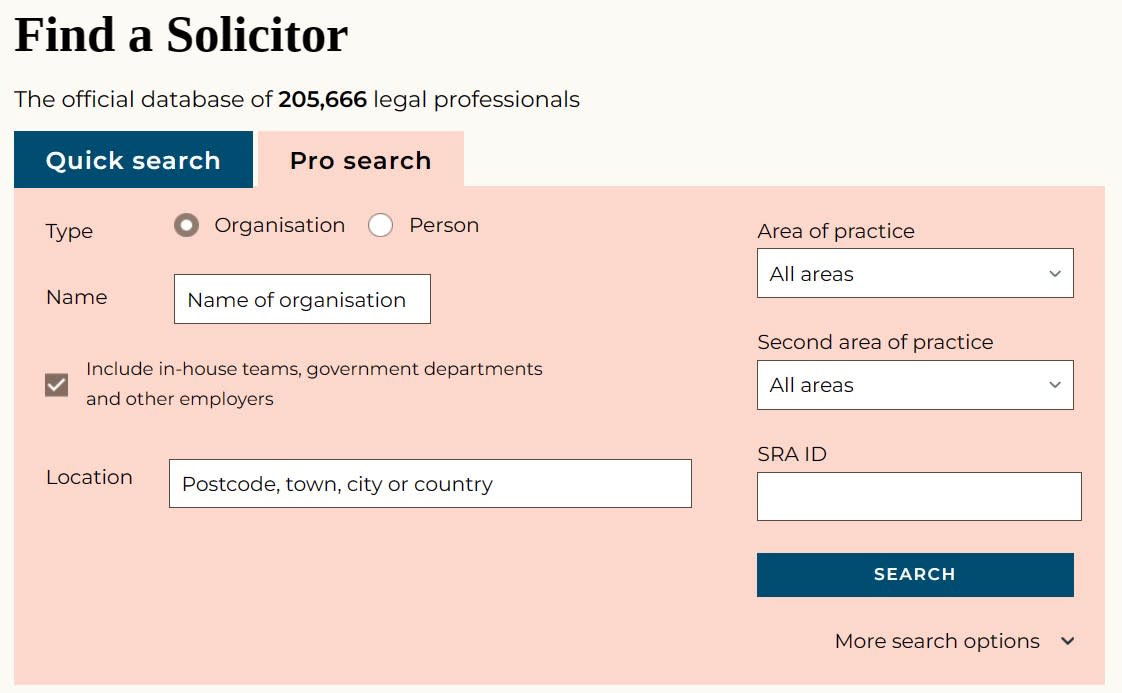
Both the Law Society and Solicitors Regulation Authority provide online tools to find solicitors in your area. These directories can offer a more comprehensive and diverse range of options.
Using them allows you to gather detailed information about a solicitor's qualifications, experience, and areas of expertise, giving you more information to make an informed decision.
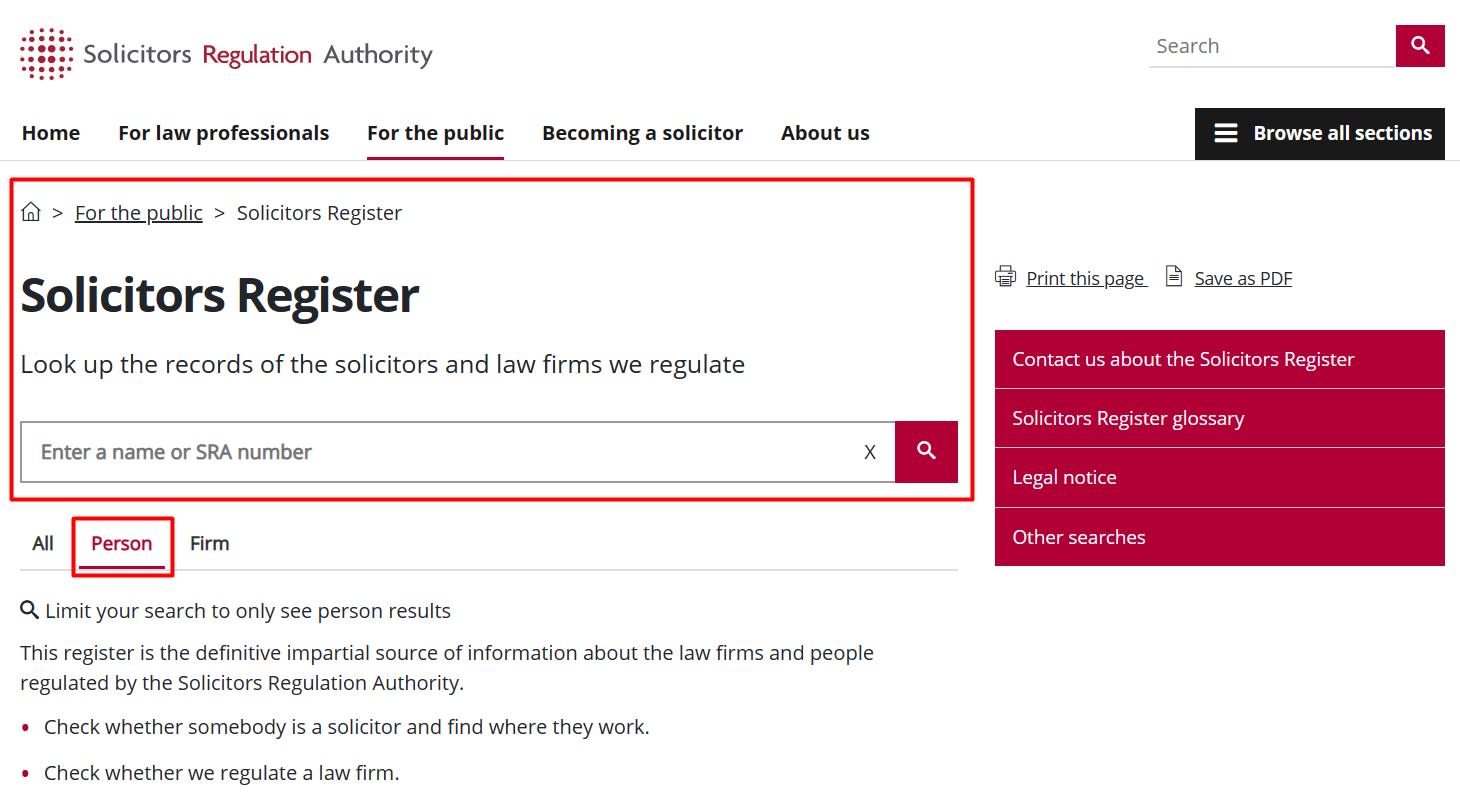
Online directories can help you narrow down your search by filtering for factors such as location, cost, and rating. However, the major disadvantage of this approach is that it can be difficult to assess the quality of a solicitor based solely on their online profile. It may be helpful to supplement your research by reading reviews and testimonials from previous clients, or by conducting an initial consultation before committing to a solicitor.
Generally, we’d advise that people looking for legal help only use these directories once they already have a solicitor in mind that they would like to work with in order to check their record.
Using Lawhive
If you don’t have any friends (maybe it’s just me!), how can you ensure that you find the best solicitor? This is one of the reasons we set out to create Lawhive!
We match you with a solicitor that specialises in your legal issue. All of the solicitors that work with us are hand-picked experts. We thoroughly vet every solicitor that works with us both initially and on an ongoing basis. This eliminates the need to rely on personal recommendations.
We also provide a more tailored and personalised approach to finding a solicitor. When you use Lawhive, you’ll be matched with a solicitor who has experience in the specific area of law you need help with. This ensures that you are getting expert advice and guidance that is relevant to your situation.
How do I know if the solicitor I’ve found is any good?
It's important to find a lawyer that you can trust and rely on to provide expert advice and representation. But how do you know if a UK solicitor is any good? Here are some factors to consider when making your decision:
Experience
The first factor to consider when choosing a solicitor is their experience. You want to find a solicitor who has experience dealing with cases similar to yours. This will ensure that they have the knowledge and expertise needed to provide you with the best possible advice and representation. Look for solicitors who have been practising for a number of years and who have a track record of success in their area of expertise. Our recommendation is to use the SRA Register to check your solicitor’s qualification date and background Before formally asking them to begin work for you.
Communication skills
It's important to find a solicitor who has good communication skills. You want to be able to understand what your solicitor is saying and to feel comfortable asking questions. A good solicitor will take the time to explain complex legal issues in a way that you can understand. They will also be responsive to your calls and emails and will keep you updated on the progress of your case.
If you are unsure, before starting work with a solicitor, we’d suggest that you arrange an initial consultation. Take note of how they communicate with you. Are they listening to your concerns and questions? Do they respond in a way that you can understand? Don't be afraid to ask for clarification or to express any concerns you have about communication. If you aren’t able to get a sense that they are a good communicator we suggest to cut your losses and find a new solicitor near you or online. There are plenty around!
Online reviews & recommendations
Online reviews can also be helpful, but it's important to take them with a grain of salt. Keep in mind that people are more likely to leave a review if they have had a negative experience, so don't let a few bad reviews discourage you. Look for patterns in the reviews and pay attention to how the solicitor responds to negative feedback. It’s also important to remember that what works well for one person may not for another and vice versa. Reviews are most useful when considered with context. If you are still concerned, we’d suggest scheduling an initial consultation with your solicitor to talk through your concerns. Any good solicitor will be more than happy to do so.
All things considered
Finding a top solicitor requires some research and due diligence. Consider the solicitor's experience, communication skills and any public or private reviews when making your decision. Don't be afraid to talk through any concerns with your solicitor in advance of asking them to complete work, but also keep in mind that both yours and the time of your solicitor is precious! If you're looking for a reliable and convenient way to find a solicitor, consider letting us help.
Explaining your case to a solicitor
The importance of calls and meetings with your solicitor should not be underestimated. It’s a powerful opportunity for you to get it all out and hear from somebody with real insight into the problem (assuming you’ve found the right solicitor by following our guide!)
Before speaking with a solicitor about your legal issue, it's important to do some preparation to ensure that you get the most out of your conversation.

Understand your legal issue
Take some time to research your legal issue so that you have a basic understanding of the area. This will help you to communicate effectively with your solicitor and to ask informed questions. That said, don’t spend too much time on this and there is definitely no need to worry if you don’t understand everything. Ultimately, you are hiring a solicitor for a reason! If you do happen to come across anything you don’t understand, try writing it up as a question to ask your solicitor when you speak with them.
Gather relevant documents
If you have already paid your solicitor to assess your case then it’s important that before talking to them about it that you gather any documents that relate to your legal issue, such as contracts, letters, or court documents. These documents will help your solicitor to understand the details of your case and to give you more accurate advice. If you are working through Lawhive, you can upload all of your documents in one place
Think about your ideal outcome
Before speaking with your solicitor, take some time to consider what your ideal outcome would be. This will help you to communicate your goals clearly and to work with your solicitor to develop a strategy to achieve them.
Write it all out!
A top tip from the team over at Lawhive is to always be fully prepared before going into any conversation with a solicitor. It can be easy to forget to ask important questions or omit crucial details during a conversation, so it's a good idea to write down everything beforehand. Doing so ensures that you get the information you need and that you don't miss anything important. We also find this has the nice added benefit of helping you structure your thoughts, understand your legal issue better and get the most out of the conversation with your solicitor
What to expect during a call or meeting with a solicitor
The contents of the conversation with your solicitor will obviously vary depending on your specific circumstances but some general rules apply.
Your solicitor will likely ask questions to better understand your case, and may provide a brief overview of the legal process and potential outcomes. As discussed above, you should make sure to answer any questions in a clear and simple way. We recommend writing out exactly what you would like to talk about before getting on a call or attending any meeting.
If you haven’t yet paid or you are looking for help with more work your solicitor will likely discuss their fee structure and how much you can expect to pay for their services. If they don’t then you shouldn’t feel shy about bringing it up yourself. Many solicitors now offer fixed fees (including all solicitors that work through Lawhive) but many still charge hourly for their services. To avoid an awkward situation later on it’s best to get this all laid out bare.
Solicitors may want to discuss timelines including an estimate of how long the legal process may take, and what steps will need to be taken next. Similar to fees, if this isn’t brought up by your solicitor then raise it with them yourself. In many cases time estimates will largely depend on external parties such as the courts or in the case of disputes, how promptly the other people involved respond. A good solicitor will clearly communicate this to you and keep you informed and up to date on exactly what is going on with your case.
If you have paid for a case assessment and legal advice then your call or meeting may include advice and guidance on how to proceed with your case, and potential outcomes based on the information and documents you've provided. We recommend that prior to an advice call or meeting you ask your solicitor if they are able to provide a transcript of your conversation with them and/or whether they are able to send over a summary of what was discussed. The best solicitors will already plan to do this but it doesn’t hurt to check!
You should feel free to ask any questions or express any concerns you may have during the call or meeting. It's important to have a clear understanding of the legal process and what to expect moving forward. If you aren’t sure what to ask, one thing we always recommend is asking your solicitor “is there anything else that I should be aware of at this stage?”.
Understanding Solicitor Fees
What's a fair price for legal work?
Determining a fair price for your legal work can be tricky. While some legal matters may require just a few hours of work, others can be complex and time-consuming, involving extensive research and/or multiple court hearings. As such, the cost of legal services can vary widely, making it difficult for you to know if you are being charged fairly. Let’s explore the factors that influence the cost of legal work and provide some guidance on what you can expect to pay for legal services.
The type of legal matter
The complexity and scope of the legal matter at hand is one of the main factors that influences the cost of legal services. Matters that are straightforward and require little research or court appearances will generally be less expensive than those that are complex and require significant amounts of time and effort. The amount of time required to complete a legal matter will also impact the cost of legal services. This includes time spent researching, drafting legal documents, attending court appearances, and communicating with you.

The experience and expertise of the solicitor
In many cases the experience and expertise of the solicitor handling your case will play a large role in the cost of legal services. Solicitors with more experience and specialised knowledge in a particular area of law are likely to charge more than those who are less experienced or have a more general practice. At Lawhive, we aren’t a big fan of this way of thinking. We believe that as experienced solicitors can complete work faster, it’s unfair for them to charge more money as they are able to complete work faster than someone with less experience would, meaning they make more money overall. We only work with experienced solicitors and they all charge the same amount through the Lawhive platform.
The location of the solicitor
The location of the solicitor can also affect the cost of legal services. Solicitors based in larger cities may charge more than those in smaller towns or less affluent areas. This is primarily because the cost of living and doing business tends to be higher in urban areas, and solicitors based in these areas may also have higher overheads, such as office rent and salaries. That said, it can go the other way as well. Occasionally solicitors in rural areas will overcharge for their services knowing that peoples options are limited.
This raises an important question. Should you really have to pay more for legal services just because of where you live? At Lawhive we don’t think so. Because we make it possible to work with solicitors based across the country, we can offer much lower prices to you regardless of where you are based. We aim to help you find the right solicitor at a fair price, regardless of location.
The time frame
The timeframe in which a legal matter needs to be resolved can have a significant impact on the cost of legal services. This is because matters that require a quick resolution may require more time and resources, leading to higher costs.
For example, if you need legal advice or representation urgently, your solicitor may need to rearrange their schedule to prioritise your case. This may mean rescheduling other appointments or working longer hours to meet your deadlines. As a result, you may be charged a higher hourly rate or additional fees for urgent services.
On the other hand, if your legal matter is not time-sensitive and can be resolved over a longer period, you may be able to negotiate a lower fee or fixed fee arrangement with your solicitor. This is because your solicitor can schedule the work around their existing workload, and may not need to dedicate as many resources to your case.
How much do solicitors cost?
Now that we've explored the factors that influence the cost of legal services, let's take a look at what you can expect to pay for legal work in the UK.
Solicitor hourly rates
Solicitors in the UK typically charge an hourly rate for their services. Hourly rates can vary widely depending on the factors outlined above, but on average in 2023, you can expect to pay anywhere from £100 to £350 per hour for a solicitor's services. That said, we recommend that you avoid hourly rates like the plague.
Why solicitor hourly rates are a bad idea
One of the biggest problems with hourly rates is that they create an incentive for solicitors to work more hours than necessary. This means that you may end up paying for time that wasn't really needed or for inefficiencies in the solicitor's work process.
Hourly rates can also lead to unpredictability in terms of costs. You won’t have a clear idea of how much your legal matter will end up costing until the work is completed. This lack of transparency can be frustrating and stressful. If you are planning on working with a solicitor and they tell you that they charge hourly, ask if they will offer you a fixed fee instead (which we’ll explore next). At Lawhive, we insist all of our solicitors ONLY offer fixed fees.
Fixed fees
Fixed fee is another type of pricing model for legal services. With a fixed fee, the solicitor agrees to complete a specific task or set of tasks for a predetermined amount of money. It's important to note that the amount you'll pay for fixed fee work is entirely dependent on the specific type of work you need.
One of the main advantages of fixed fee pricing is that it allows you to budget for legal services without worrying about unexpected costs. By going for a fixed fee you’ll get peace of mind knowing that the solicitor has agreed to complete the work for the agreed-upon fee, regardless of how long it takes to complete the task. We strongly recommend negotiating a fixed fee with any solicitor that you work with.
Do I have to pay a solicitor upfront?
If you are working with a solicitor on a fixed fee basis you may be given the option to pay the entirety of your legal costs upfront or later on once some or all of the work has been completed. Paying upfront can be beneficial as it can help you budget and avoid any unexpected expenses down the line. It also provides a level of security, knowing that you have already paid for the services you need. However, it’s not always possible to pay everything upfront as in many cases the next action your solicitor will take could be based on a response from a counterparty. In these cases your solicitor will usually let you know what the fee you are paying covers and the indicative cost of future work should you continue to work with them.
Paying later, or in instalments on the other hand, can offer more flexibility as you can pay for the services over time or after the case has been resolved. This can be especially helpful if you are facing financial difficulties or have limited funds available but need help on a short timeline. The downside is that it can make it difficult to budget for legal work. Additionally if your solicitor hasn’t clearly communicated what the fees you are yet to pay will cover then you can find yourself in a situation where your solicitor charges you more than you initially anticipated. If you can afford it, generally we’d advise sticking with payment upfront.
Can I negotiate solicitors fees?
Lot’s of people ask us whether it’s possible to negotiate with their solicitor on the cost of legal services. The short answer is yes, it is often possible to negotiate with a solicitor on their fees. However, negotiating the price of legal services can be a delicate matter and requires careful consideration. Let’s explore some tips for negotiating price with a solicitor, and how in some cases it may not be necessary.
Tips for negotiating price with a solicitor
Do your research: Before entering into negotiations with a solicitor, it is important to research the going rate for legal services in your area. This will help you to understand the range of prices that are fair and reasonable. If you are looking for prices in your local area, check out the Lawhive site. We track prices for a variety of types of legal work across the country.
Be clear about your budget: It is important to be upfront and clear about your budget with your solicitor. If you have a limited budget, your solicitor may be able to suggest ways to keep costs down (if you are paying hourly) or offer a fixed fee for their services.
Be prepared to walk away: If negotiations are not successful, it is important to be prepared to walk away. There are many solicitors out there, and it is important to find one that is a good fit for both your legal needs and your budget.
How Lawhive sets its fees
We believe in providing transparent and fair pricing for our legal services. All of our solicitors use a fixed fee pricing model, which means you’ll know exactly what you’re paying upfront. Our fixed fees are based on the complexity and scope of the legal matter at hand, and we provide a detailed breakdown of the costs involved. Because we work with solicitors from all over the UK our prices are much cheaper than you’d find at a high-street law firm. If you find a cheaper price elsewhere just let us know and we will be more than happy to beat it by at least 10%.
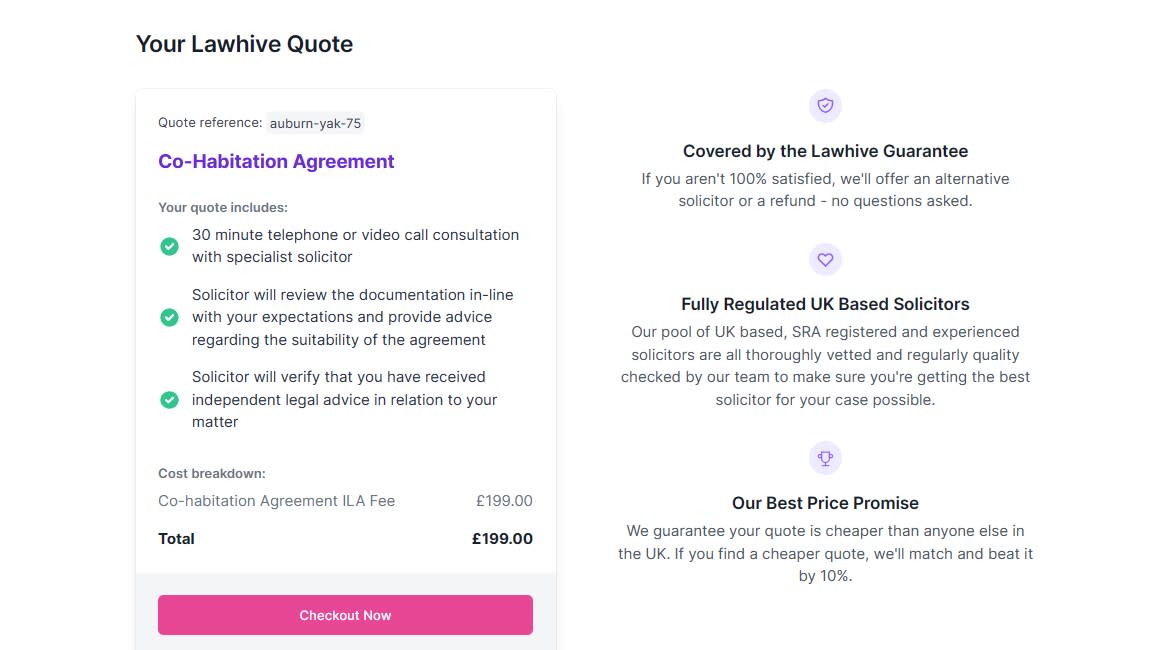
The different ways to pay for legal services
So you’ve diligently followed our guide, negotiated a legal fee with your solicitor and now it’s time to pay. There are various payment methods that solicitors may accept. These payment methods can include:
Bank transfers
Most solicitors in the UK will ask that you make payment via bank transfer. This method of payment is fast and allows you to transfer funds directly from your bank account to the solicitor's account. It does have some downsides however. Bank transfers can make refunds tricky and it can be difficult to reclaim funds if there is a dispute or you send money to the wrong account. Fraudsters are known to take advantage of this so if you are paying a solicitor via bank transfer make sure to double check that the details you were provided are in fact those of your solicitor.
Credit or debit cards
Some solicitors may also accept payment via credit or debit card. This method of payment can be convenient, allowing you to easily make payments online or over the phone. Additionally disputes are easier to resolve as credit and debit cards offer a formal “chargeback” process which allows you to make a case to reclaim money.

How we recommend you pay
When you pay for work through Lawhive, you will be able to use a credit/debit card. We’ve worked with thousands of clients and have found that card provides the best balance of convenience and security. We use a secure payment gateway to process payments and we do not store your payment information on our servers. This means that your information is protected from any potential security breaches.
Working with your solicitor
If you are still with us, congrats! That means you’ve found a world class solicitor, explained your issue to them, negotiated a fair price and started working together. Either that or you are just really interested in the theory behind finding a solicitor! Next we’ll cover everything you need to know about the actual process of working with your solicitor.
The legal process
The way your solicitor handles your case can vary depending on the type of work you need However, there are some general stages that most legal cases go through.
Verifying your identity
In order to comply with anti-money laundering (AML) regulations, solicitors are required to perform identity verification and AML checks on people they work with. This involves verifying your identity and conducting checks to ensure that your funds are not derived from illegal or illicit activities.
The documents required normally include a proof of identity such as a passport or driver's licence. Your solicitor may also ask for proof of address, such as a utility bill or bank statement. This information is used to verify your identity and comply with AML regulations. If you work through Lawhive this is all taken care of automatically. After paying for your case you’ll be asked to take a selfie holding an identity document. Once that’s done we’ll handle everything else. You should receive an email letting you know work on your case has begun as soon as we’ve verified your identity.
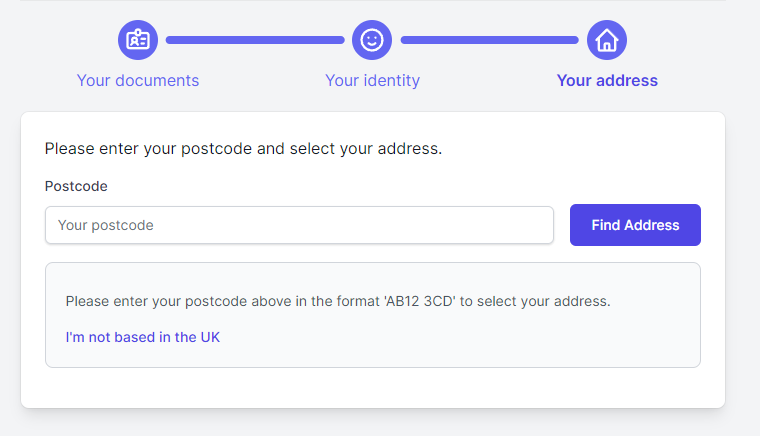
Legal research
Once the work begins, your solicitor will want to review any documents and/or evidence that you have. Additionally they will likely conduct legal research to determine the relevant laws and regulations that apply to your situation. This may involve reviewing case law, statutes, and regulations, as well as consulting with other legal experts if necessary. For solicitors with a lot of experience in the area you need help with, this research will normally take just a few hours.
Consultation
At this point in your legal journey, you may have already had an initial consultation. Many consultations happen prior to a solicitor starting work. However, in some cases your solicitor may ask for a second call having spent time reviewing your documents and/or evidence as well as relevant laws. The tips and tricks we explored previously to make the most of this call still apply here and we suggest that you refer back to them!
Legal strategy
Next your solicitor will develop a legal strategy for your case. This will involve identifying your legal options and determining the best course of action based on your individual circumstances. The solicitor will discuss the legal strategy with you and answer any questions you may have. At Lawhive this happens via our messaging system within a few days of your solicitor starting work on your case.
Doing the work
Depending on the legal matter and the strategy they have defined, your solicitor may now engage in negotiation with other parties involved, or proceed directly to litigation. If your case is more standard or doesn’t involve anybody else then your solicitor will just complete any documents/applications that are required.
As part of explaining the legal strategy to you, your solicitor should’ve already communicated expected timelines to you. If they haven’t then reach out to ask them. The period whilst your solicitor does the legal work can be the most anxiety inducing because it isn’t always clear what is going on. A good solicitor will regularly keep you up to date with what’s happening but resist the temptation to harass and slow your solicitor down by bombarding them with messages or requests. See our guidance on how frequently to communicate with your solicitor.
Resolution
Hurrah! Your solicitor has let you know that the legal work has been completed. This is a good time to check with your solicitor what happens next and whether any further legal action will be required. If you paid a fixed fee for your work then your solicitor should let you know the costs for any further work they complete. As always, our advice is to pay for this work upfront to keep things simple.
Communication from your solicitor
We’ve already explored how important clear communication is to your solicitor. It goes the other way too. Once work has started you’ll want to know what’s going on with your case.
How long does it take to hear back from a solicitor?
Slow responses from a solicitor can be incredibly frustrating. At the same time, it’s important to understand that just because a solicitor isn’t contacting you hourly doesn’t mean nothing is getting done. The question then is how frequently can you expect to hear from them?
In general, you can expect to receive a message or occasionally a phone call each time a solicitor completes a certain milestone in your case. In our experience this works out to roughly once per week. For cases that are particularly urgent daily updates are not uncommon.
It's important to establish clear communication expectations with your solicitor at the outset. If it wasn’t discussed in an initial consultation then now is better than never. If you aren't sure how your case is progressing and haven't heard back from your solicitor for a while you should politely ask them for an update. If you are working through Lawhive you will be able to send your solicitor a message any time through our messaging system and whenever they send you anything we’ll let you know via email.
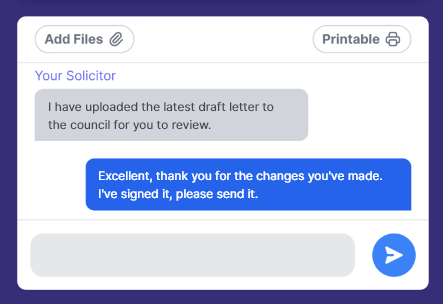
What’s a reasonable timeline for my legal work
The timelines for legal work can vary widely depending on the nature of the case and the specific circumstances involved. In some cases, legal matters can be resolved quickly and efficiently, while in others, it may take weeks, months, or even years to reach a resolution. The timeline will depend on a variety of factors, including the complexity of the case, the number of parties involved, and the availability of key information or evidence. Some of these things you control. By providing your solicitor with everything they need to get started immediately and responding promptly to any requests they make for extra information you can normally avoid a lot of headaches later on. If you are working through Lawhive, as soon as you’ve paid for your case, upload any documents/evidence you have via the documents tab on the platform.

Once a legal strategy has been created your solicitor should be able to give you a general idea of how long it will take to complete your case based on their experience and expertise. Keep in mind that timelines are subject to change based on a variety of factors, so it's important to remain flexible (within reason) throughout the process.
What happens once a solicitor has finished my work?
Your solicitor has gotten back to let you know they’ve completed the work they agreed to. The end is finally in sight! In most cases there are still a few minor things you’ll need to address.
Follow-on work or cases
In some situations, you may require further legal help, either on the same issue or a related matter. Examples include:
Unresolved or new issues
While your solicitor may have addressed the primary concern, it's possible that additional issues have arisen or in some cases you may want to appeal a decision or continue with court action. In such cases, you'll need to seek further legal help to ensure that all aspects of your matter are adequately addressed. If you are using Lawhive, drop your solicitor a message via the platform letting them know if they aren’t already aware. You’ll receive an email with a quote for the new work and once paid your solicitor will get started.
In the case the primary issue has not been resolved or you had a bad experience with your solicitor, you may want to explore your options to file a complaint.
Other legal work
If you've had a great experience with your solicitor and feel like you've built a solid connection with them, you may want help from them with an entirely separate issue. With the trust and rapport you've already established, working together on new legal matters will be a lot simpler than using a new solicitor. Once you’ve finished your case on the Lawhive platform you’ll retain the ability to log in so if you ever do want to reconnect in the future for help with legal work you are able to.
Ongoing advice & court directions.
Some legal matters, such as business contracts or estate planning, may require ongoing advice and assistance from your solicitor to ensure that you remain compliant with the law and that your interests are protected as circumstances change over time. Additionally, in certain cases, a court may issue orders that require you to take specific actions, such as attending mediation or completing additional documents such as a possession order. In these situations, your solicitor can help you understand and comply with any requirements set out. This ensures that you meet your legal obligations and nothing important gets dropped.
How to review a solicitor: sharing your experience and helping others
Sharing feedback and reviewing your solicitor after they have completed work is an essential part of the process. Not only does it help other people make informed decisions, but it also allows your solicitor to improve. At Lawhive, we collect lots of data from the reviews we receive about solicitors to ensure that the solicitors we work with are performing well and providing the people they work with a great experience.
Where do I leave my review?
There are several reputable websites and platforms where you can share your experience with a solicitor. Some popular options include:
Trustpilot: Trustpilot is a well-known review platform where you can provide honest feedback about your solicitor. By sharing your experience on Trustpilot, you can contribute to the solicitor's online reputation and help potential clients make informed decisions.

Google Reviews: Leaving a review on Google allows your feedback to appear directly in search results when others look for information about the solicitor. This can significantly impact a solicitor's online presence and visibility.
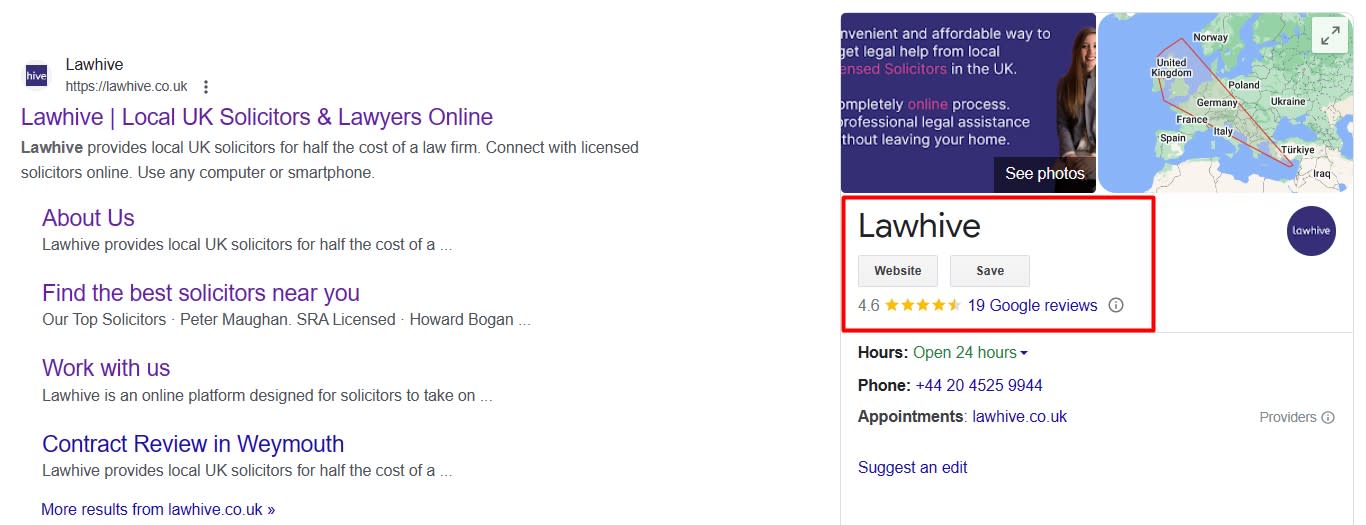
Lawhive: As a managed marketplace, we actively collect reviews and feedback from clients about their solicitors. Your input helps us maintain a high standard of service and ensures that other people looking for help are matched with top-quality solicitors. Once you or your solicitor indicates that work has been completed we’ll reach out to you to ask how everything went.

What should I write in a solicitor review?
When reviewing your solicitor, keep the following things in mind:
Be honest and respectful: Whether your experience was positive or negative, it's important to be honest about it. Describe the specific aspects that impressed you or areas where you believe the solicitor could improve. Always maintain a respectful tone, even when expressing dissatisfaction.
Share specific details: To make your review more helpful, share specific details about your case, the solicitor's approach, and their communication style. This will provide potential clients with a better understanding of what to expect when working with the solicitor.
Mention any standout qualities: If your solicitor went above and beyond in any way or demonstrated exceptional expertise, be sure to mention it in your review. These standout qualities can make a significant difference for potential clients when choosing a solicitor.

By taking the time to review your solicitor, you not only help others make informed decisions but also contribute to maintaining high standards within the legal services industry. Additionally, platforms like Lawhive use these reviews to ensure that clients are matched with qualified and reliable solicitors, ultimately leading to better overall experiences.
Finding a solicitor needn't be so tricky
With an ever-growing demand for legal services, there's no denying the importance of finding a solicitor suited to your needs. We hope this article has made the process more accessible and transparent, empowering you to make informed decisions about how to get help.
Creating and maintaining a relationship with a solicitor may seem overwhelming, but with Lawhive we’ve tried to make it simple and stress-free. We hope that you’re inspired to make the most of your legal journey, and rest assured that the perfect solicitor is just a few clicks away.
